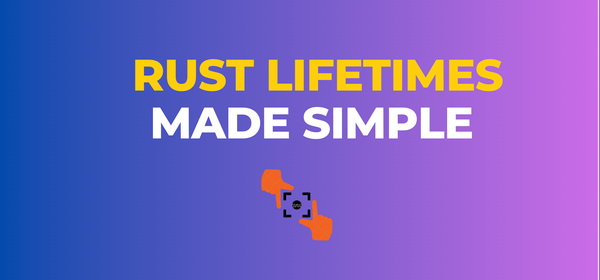Rust Dynamic vs Static Dispatch
Dynamic and static dispatch are two different ways of handling method calls in the Rust programming language. Understanding the differences…

Dynamic and static dispatch are two different ways of handling method calls in the Rust programming language. Understanding the differences between them, their advantages, and when to use each is essential for efficient and effective Rust programming.
Static Dispatch
Static dispatch occurs at compile time. Rust uses static dispatch by default. This means the compiler knows the exact type of the method being called and can thus inline these calls, leading to faster execution.
Advantages:
Performance: Since the method to call is determined at compile time, it can be inlined, resulting in faster code.
Type Safety: The compiler can enforce type constraints strictly.
Disadvantages:
Code Bloat: Each generic instantiation results in duplicate code.
Less Flexible: It’s harder to write code that works with types not known until runtime.
Code Example:
trait Animal {
fn speak(&self);
}
struct Dog;
impl Animal for Dog {
fn speak(&self) {
println!("Bark!");
}
}
struct Cat;
impl Animal for Cat {
fn speak(&self) {
println!("Meow!");
}
}
fn make_sound<T: Animal>(animal: &T) {
animal.speak();
}
fn main() {
let dog = Dog;
let cat = Cat;
make_sound(&dog);
make_sound(&cat);
}In this static dispatch example, we first define a trait named Animal with a single method speak. This trait serves as a contract, specifying that any type implementing it must provide its own version of the speak method. Following this, we introduce two structs, Dog and Cat, each representing a specific type of animal. The key part of this example is how we implement the Animal trait for both Dog and Cat. Each implementation provides a unique behavior for the speak method, respecting the contract established by the Animal trait.
- Structs Definition: Two structs,
DogandCat, are defined. These will represent specific types of animals.
Dynamic Dispatch
Dynamic dispatch occurs at runtime. In Rust, dynamic dispatch can be achieved using trait objects like Box<dyn Trait>. The specific method to be called is determined at runtime based on the actual type of the object.
Advantages:
Flexibility: Can call methods on types that are only known at runtime.
Reduced Code Size: Only one instance of each generic method is compiled.
Disadvantages:
Performance Overhead: The runtime lookup of methods incurs a slight performance penalty.
Complexity: It might be harder to reason about code due to the indirection.
Code Example
trait Animal {
fn speak(&self);
}
struct Dog;
impl Animal for Dog {
fn speak(&self) {
println!("Bark!");
}
}
struct Cat;
impl Animal for Cat {
fn speak(&self) {
println!("Meow!");
}
}
fn make_sound(animal: &dyn Animal) {
animal.speak();
}
fn main() {
let dog = Dog;
let cat = Cat;
make_sound(&dog);
make_sound(&cat);
}In the dynamic dispatch example, the initial setup remains largely the same. We have the Animal trait and the Dog and Cat structs
with their respective implementations of the Animal trait's speak method. The significant difference arises in how the make_sound function is defined and used.
In this scenario, the make_sound function takes a parameter of the type &dyn Animal, which is a trait object. This trait object is a pointer to both an instance of a type implementing Animal and a vtable (a lookup table for function pointers). What this setup facilitates is dynamic dispatch. Unlike in static dispatch, the compiler does not determine at compile time which speak method to call. Instead, at runtime, Rust uses the vtable associated with the trait object to look up and call the appropriate speak method.
When we call make_sound(&dog) or make_sound(&cat), Rust dynamically determines which speak method to invoke based on the actual type of the object referred to by the trait object. This approach introduces a runtime overhead due to the indirection of the vtable lookup, but it offers increased flexibility. It allows us to write functions like make_sound that can accept a variety of types, as long as they implement the Animal trait, without needing to know what those types will be at compile time.
When to Use Each
Use Static Dispatch When:
- Performance is a key concern.
- Working with a limited set of known types.
- Want to leverage compile-time type checking and optimizations.
Use Dynamic Dispatch (Trait Objects) When:
- You need to work with collections of different types that implement the same trait.
- The exact types you’re working with are only known at runtime.
- Reducing binary size is more important than maximizing performance.
Trade-offs and Considerations
It’s essential to understand that the choice between static and dynamic dispatch is not just about performance and flexibility but also involves considering the design and maintenance of your code:
- Code Maintainability: Static dispatch can lead to more straightforward code since it involves less indirection. However, if you’re dealing with many types, it can lead to code bloat, making the codebase harder to maintain.
- Memory Usage: Dynamic dispatch might use more memory due to the storage of pointers for runtime lookup, but it avoids the code duplication that comes with static dispatch.
- Caching and Predictability: Static dispatch can be more cache-friendly as the method calls can be inlined, leading to more predictable performance. Dynamic dispatch, with its runtime decision-making, might be less predictable in performance.
- Use Case Specificity: Sometimes, the decision is straightforward due to the requirements of the use case. For example, in a plugin architecture where the types are unknown until runtime, dynamic dispatch is almost a necessity.
Best Practices
- Start with Static Dispatch: Since Rust favors static dispatch, start with it and consider dynamic dispatch if you encounter situations where it’s clearly beneficial.
- Profile Your Code: If performance is a concern, profile your application to understand the impact of your dispatch choices. Sometimes the theoretical performance difference might not be significant in practice, and the flexibility of dynamic dispatch could be more beneficial.
- Use Trait Objects Wisely: When using dynamic dispatch, be mindful of where you use trait objects. Overusing them can lead to unnecessarily complex code. Employ them in scenarios where their flexibility is a clear advantage.
- Consider Code Reusability: Static dispatch can be more type-safe and allow for greater compile-time optimizations, but it can sometimes result in less reusable code due to type-specific implementations. Striking a balance based on the requirements of your project is key.
- Refactor When Necessary: As your project evolves, so will your understanding of its needs. Don’t hesitate to refactor from static to dynamic dispatch (or vice versa) if it better suits the evolving requirements.
- Documentation and Comments: Regardless of your choice, document your reasoning. This helps future maintainers (including yourself) understand why a particular method of dispatch was chosen.
🚀 Explore a Wealth of Resources in Software Development and More by Luis Soares
📚 Learning Hub: Expand your knowledge in various tech domains, including Rust, Software Development, Cloud Computing, Cyber Security, Blockchain, and Linux, through my extensive resource collection:
- Hands-On Tutorials with GitHub Repos: Gain practical skills across different technologies with step-by-step tutorials, complemented by dedicated GitHub repositories. Access Tutorials
- In-Depth Guides & Articles: Deep dive into core concepts of Rust, Software Development, Cloud Computing, and more, with detailed guides and articles filled with practical examples. Read More
- E-Books Collection: Enhance your understanding of various tech fields with a series of free e-Books, including titles like “Mastering Rust Ownership” and “Application Security Guide” Download eBook
- Project Showcases: Discover a range of fully functional projects across different domains, such as an API Gateway, Blockchain Network, Cyber Security Tools, Cloud Services, and more. View Projects
- LinkedIn Newsletter: Stay ahead in the fast-evolving tech landscape with regular updates and insights on Rust, Software Development, and emerging technologies by subscribing to my newsletter on LinkedIn. Subscribe Here
🔗 Connect with Me:
- Medium: Read my articles on Medium and give claps if you find them helpful. It motivates me to keep writing and sharing Rust content. Follow on Medium
- Personal Blog: Discover more on my personal blog, a hub for all my Rust-related content. Visit Blog
- LinkedIn: Join my professional network for more insightful discussions and updates. Connect on LinkedIn
- Twitter: Follow me on Twitter for quick updates and thoughts on Rust programming. Follow on Twitter
Wanna talk? Leave a comment or drop me a message!
All the best,
Luis Soares
luis.soares@linux.com
Senior Software Engineer | Cloud Engineer | SRE | Tech Lead | Rust | Golang | Java | ML AI & Statistics | Web3 & Blockchain



